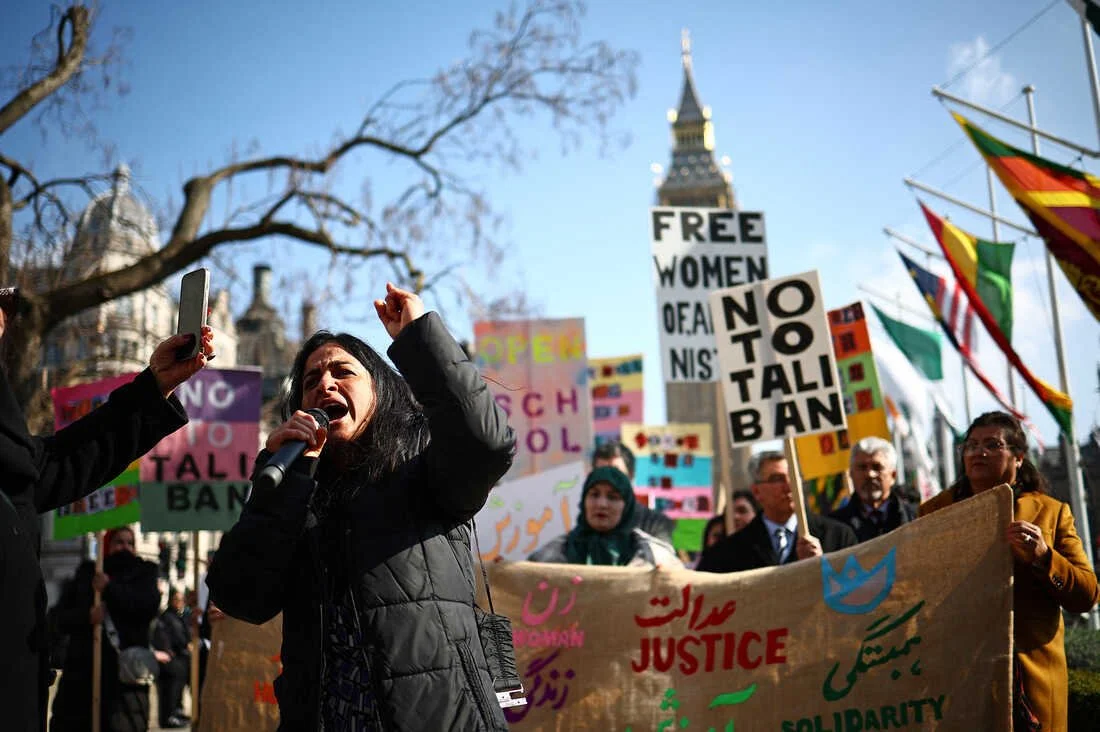International Women’s Day Op-ED
On Monday [10 March], the UN Commission on the Status of Women – which claims to promote gender equality and empower women – will gather https://www.unwomen.org/en/how-we-work/commission-on-the-status-of-women/csw69-2025 in New York for its annual meeting.
In the chair will be the commission’s chair, Saudi Arabia’s UN ambassador, Abdulaziz M. Alwasil. Fittingly, Ambassador Alwasil is a man.
Despite some recent progress, Saudi Arabia’s record on women’s rights is, to put it diplomatically, somewhat chequered. Women have only been allowed to drive in the kingdom since 2018 and it still ranks in the bottom 20 of the World Economic Forum’s Global Gender Gap Index.
Saudi Arabia’s leadership role on the commission isn’t an anomaly. In recent years, Algeria has served as a vice-chair, as has Iraq. Current members of the body include Pakistan – second to last in the Global Gender Gap Index – and Taliban-run Afghanistan, which no longer figures at all.
Perhaps most egregious was the election in 2019 of Iran to the commission’s panel which judges allegations of women’s rights violations, including the arbitrary arrest of women and deaths and torture of women in custody – subjects on which Tehran has dubious expertise.
Against this backdrop, a plethora of UN bodies, including the General Assembly, the Human Rights Council, the World Health Organisation and the Economic and Social Council, single Israel out for demonisation and delegitimisation while frequently remaining silent on the crimes of the world’s greatest human rights abusers and aggressors, including Russia, China and Iran.
Given this rank hypocrisy, it's perhaps unsurprising that, following the 2023 Hamas attacks on Israel, it took UN Women – another UN body supposedly “dedicated to women’s equality and empowerment” – 50 days to acknowledge the grotesque sexual violence perpetrated against Israeli women by the Iranian-backed terror group.
Apparently, the evidence of rape was reportedly “not solid” – despite the whole world having witnessed video footage of Israeli women with blood-sodden crotches on 7 October itself and reports from witnesses detailing the sexual mutilation of dead Israeli women.
Indeed, even after the UN’s Special Representative on Sexual Violence in Conflict visited Israel and produced a report in which she spoke of “a catalogue of the most extreme and inhumane forms of killing, torture and other horrors”, the UN’s annual report on sexual violence published last April refused to attribute these crimes to Hamas saying a “fully fledged investigation” was required.
With a stunning lack of self-awareness, UN Women’s annual report for 2024 pats itself on the back for refusing “to forget those left behind and impacted by crises”. The plight
of women in Gaza, Ukraine, Afghanistan, Sudan and the Democratic Republic of the Congo – all worthy of attention and concern – were singled out. Predictably, there was no mention of the Israeli victims of Hamas – those raped, tortured and murdered on 7 October and those held hostage by the terrorists in Gaza.
The UN is hardly alone in struggling to expend an iota of sympathy on Israeli women. As the journalist Hadley Freeman reported last year, in the months after 7 October, not a single UK charity concerned with protecting women from violence specifically condemned Hamas’ actions – except Jewish Women’s Aid.
The twisted irony is that Israeli women enjoy rights enjoyed by no other women in the Middle East.
Israel – which in 1951 passed the Women's Equal Rights Law, which provides for “one law for men and women” – remains the only country in the region in which, as Freedom House puts it, “women generally enjoy full political rights in law and in practice”.
Unlike its neighbours, it has achieved parity on educational attainment (ranking globally alongside countries including the UK, New Zealand, and France).
And it also leads the region on women’s economic participation and opportunity (ranking alongside the Netherlands and ahead of Germany).
As the world marks International Women’s Day, many Israeli women will, no doubt, be understandably focused on the social and economic gender inequalities which they – like women in Britain and around the world – continue to face.
But only in Israel will women in the Middle East be able to take to the streets and raise their voices in protest without fear of arrest, detention or worse.
Just don’t expect the international “women’s empowerment” circus gathering in New York next week to recognise that essential and undeniable truth.

